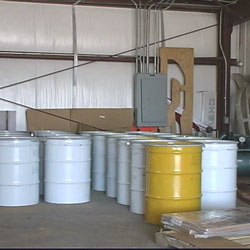SEA Stormwater
Preventing Stormwater Pollution: Materials Storage and Spill Cleanup
Employees can help reduce waste and water pollution by making sure that materials are:
- NOT spilled or washed into storm drain systems
- stored and handled safely
- cleaned up properly

Store and Handle Materials Safely
- Read and follow label or MSDS instructions and local procedures.
- Store materials in original containers or clearly label replacement containers.
- Keep containers closed or sealed except when in use.
- Maintain all containers and replace those that leak.
- Inspect all containers regularly.
Best - indoors in sealed containers.
Good - outdoors in sealed containers, within a covered paved area.
Acceptable - outdoors in sealed containers, on an uncovered, paved area.

Spill Trapping Device Recommendations
- Indoors - store barrels on a spill containment base.
- Outdoors - storage areas should be bordered by a curb or berm to contain spills.
- Store materials away from high-traffic areas to prevent accidents that might cause spills or cause spilled material to be spread.

Liquid Spills
- Follow cleanup instructions specified on the MSDS and local procedures.
- Containing spills:
- Use a drip pan or an absorbent to collect spills.
- Use drain mats to cover storm drain inlets.
- Locate the source of the spill and take steps to stop further spillage.
- DO NOT hose the spill into a storm drain.
- Immediately clean up spills using absorbent materials and follow proper disposal procedures.
- Report large spills or spills of hazardous materials to your supervisor or environmental department personnel.

Dry Material Spills
- Cover a powder spill with plastic sheeting to keep it from spreading until the spill can be cleaned up.
- DO NOT hose the spill into a storm drain.
- If usable, place spilled material in original or properly marked container.
- Follow procedures for disposal of spilled material that cannot be used.